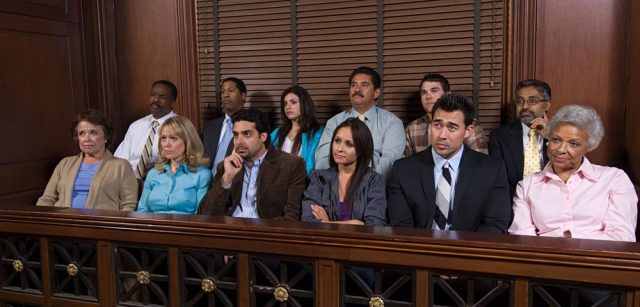Serving on a jury is normally compulsory for individuals who are qualified for jury service. A jury is intended to be an impartial panel capable of reaching a verdict. Procedures and requirements may include a fluent understanding of the language and the opportunity to test jurors' neutrality or otherwise exclude jurors who are perceived as likely to be less than neutral or partial to one side. Juries are initially chosen randomly, usually from the eligible population of adult citizens residing in the court's jurisdictional area.
A head juror is called the foreperson, foreman or presiding juror. The foreperson may be chosen before the trial begins, or at the beginning of the jury's deliberations. The foreperson may be selected by the judge or by vote of the jurors, depending on the jurisdiction. The foreperson's role may include asking questions (usually to the judge) on behalf of the jury, facilitating jury discussions, and announcing the verdict of the jury.
The petit jury or trial jury sometimes hears the evidence in a trial as presented by both the plaintiff and the defendant . After hearing the evidence and often jury instructions from the judge, the group retires for deliberation, to consider a verdict. The majority required for a verdict varies. In some cases it must be unanimous, while in other jurisdictions it may be a majority or supermajority. A jury that is unable to come to a verdict is referred to as a hung jury. The size of the jury varies; in criminal cases involving serious felonies there are usually 12 jurors.
A grand jury, a type of jury now confined almost exclusively to federal courts and some state jurisdictions in the United States, determines whether there is enough evidence for a criminal trial to go forward. Grand juries carry out this duty by examining evidence presented to them by a prosecutor and issuing indictments, or by investigating alleged crimes and issuing presentments. A grand jury is traditionally larger than and distinguishable from the petit jury used during a trial, usually with 12 jurors. It is not required that a suspect be notified of grand jury proceedings. Grand juries can also be used for filing charges in the form of a sealed indictment against unaware suspects who are arrested later by a surprise police visit.

